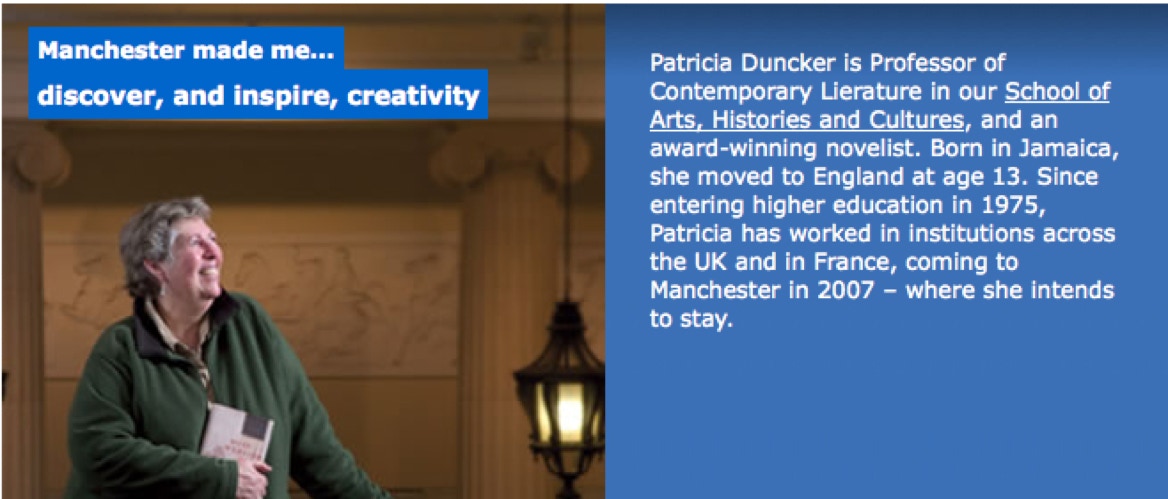

Did you always want to be a writer?
“Yes. My aunt was a writer: Patricia Beer, a poet, who died about 11 years ago. She was my guardian when I first came to this country. She was very glamorous, intelligent and well-read, and I wanted to be like her. Everything about my life and the choices I make come back to her.
“I believe poetry changes lives; indeed, I know it does. I think poetry comes first, because it’s where the language is re-made, and re-imagined.”
What’s it like combining academia with a writing career?
“The wonderful thing about it is that the texts I read and teach feed directly into what I write, so I feel my teaching is nurturing my writing all the time. For me, reading is the most enriching and liberating thing.
“During terms I have little time for writing, which is actually an advantage for me. One of the problems of being a writer is that you have a vision of what the writing will be like in your head, which might not reflect the reality of your first draft. So you need to leave your draft to compost down; then, once it rots into mulch, you take it out again and can see what is actually there, rather than what you’re imagining. Then you can work on the next draft. Writing is really about re-writing.”
Do you think an English degree helps aspiring writers?
“It’s invaluable. An English degree does three things: it teaches you to think independently; it makes you read texts very closely and become suspicious of what you read; and it nourishes a sensibility and imagination that is both compassionate and judgemental. Judgement is very important.
“And it’s not just for writers, of course; lots of people I know in various professions have English degrees. In legal careers, you have to write prose that is extremely discriminating and precise. In management and business, having an English degree is enormously helpful for writing things like strategy documents. Contrary to popular belief, employers say they do like arts degrees, because arts students are usually very subtle and thoughtful.”
What advice would you give to an aspiring writer?
“Read. Some aspiring writers say that they’re worried about reading in case they get influenced. The answer to that is to get down on your knees and pray to be influenced, because it’s the only thing that’s going to save you.”
What are your career goals?
“The most important thing to me is my teaching. Especially the first years: they are the lynchpin. I feel that the very creative and interesting teaching, which I was lucky enough to get, is very hard to come by. Many students arrive expecting something very packaged; they want ‘the answer’. You have to unpick their preconceptions about what reading is.
“I think it’s absolutely crucial to teach first-years in such a way that not only opens up their eyes to the oceans of knowledge that surround them, but gives them the confidence and the desire to plunge in. I hope that our students come out with an independent mind – a mind that discerns, judges and chooses for itself.”
What advice would you give to a student?
“Again: read. If you want to be a writer, read. And if you want to learn how to think, read. It’s very simple. Next question.”
Name three things a new student should bring to Manchester
“An open mind. A passion for the written word. And the ability to think yourself wrong – by which I mean, learning how to see where you’ve gone wrong. Committing to self-awareness, recognising your own delusions. That’s one of the hardest things for human beings. Nothing frightens me more than the thought that I might be deluded.”
What do you most enjoy about teaching/working with postgraduate students, both taught and research?
The postgraduates come with their own preoccupations and literary interests - their own agendas. Sometimes they want to pursue an interest they developed as undergraduates- and sometimes they come to us from other universities in other countries wanting to take advantage of what we offer that is special. I had one MA student from Poland wanting to think about contemporary sexual behaviour from a theoretical and philosophical perspective . His original degree was in Philosophy and English and he came to do our Gender and Sexuality MA.
Why should someone study at Manchester for their Creative Writing PhD?
The Critical and Creative PhD is exceptionally challenging as the students must master two very different discourses: an original creative approach to their own writing and a level of critical ability that is precisely comparable to students doing a literary PhD. It's a tough call. But I have had two students very recently who pulled it off. One of them wrote a fabulous literary Horror Novel and an original piece of research on contemporary American writing which involved archival research in New York. The other wrote a wonderful domestic novel about two sisters, which was also something of a sinister whodunnit, and a critical thesis about a British woman writer she admires, who also writes sisters novels. Our Department here at Manchester excels on both fronts. We can offer students practising novelists and poets as their teachers as well as critical experts in the field of literary studies. So every student will usually have two supervisors and a third research panel member as support and back up. That role is fun to do too as you get a strong sense of the postgraduate work going on around you.
All Rights Reserved. Patricia Duncker 2024